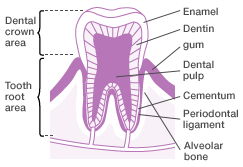Periodontal disease occurs in the tissue supporting teeth. It is referred to as one of the two major oral diseases, together with caries. The progression of periodontal disease is not so noticeable, as there are no subjective symptoms, including pain.

-
- Periodontal disease is a silent disease that progresses without pain. It can be prevented through self-care, so preventive measures should be taken on a daily basis.
Characteristics of Periodontal Disease
 Structure of the Tooth
Structure of the Tooth
The figure on the right is a cross-sectional diagram of a tooth and its surrounding area. The tooth is rooted in the jaw bone called the alveolar bone, and the cementum of the surface of the tooth root and the alveolar bone are connected by a fibrous tissue called the periodontal ligament. The gums have the role of covering the alveolar bone in order to protect it. Diseases that occur in these periodontal tissues supporting the teeth are collectively called periodontal disease.
Characteristics of Periodontal Disease
Periodontal disease is called a “silent disease”, as it progresses silently, without pain. Since it is asymptomatic, it is left untreated in many cases, and by the time the patient notices its symptoms, it is often in a far-advanced stage. Although periodontal disease is often thought of as a disease that affects only middle-aged and older people, it is a common disease that affects many people in the country. Over 80% of adults 30 years old of age or older have periodontal disease and, in recent years, it has even spread to young people, including elementary and junior high school students. Periodontal disease can be prevented through self-care. Prevent periodontal disease by means of regular checkups at your dentist, in addition to every day care at home.
What Happens if Periodontal Disease Is Left Untreated?
Periodontal disease progresses without a person noticing it, and destroys the periodontal tissue. If periodontal disease is left untreated, teeth will become loose and unable to chew, eventually leading to the loss of teeth. In addition, recent studies have clarified that periodontal disease affects the health of the entire body. Therefore, if you acquire periodontal disease, early treatment is necessary.
![What is Periodontal Disease? [Periodontal Disease]](image/h1_self_04.gif)